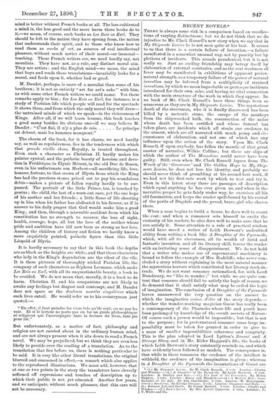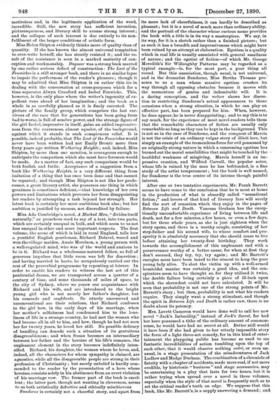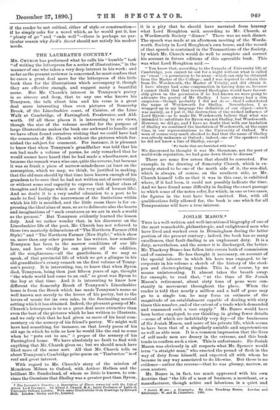RECENT NOVELS.*
THERE is always some risk in a comparison based on recollec- tions of varying distinctness ; but we do not think that we do injustice to Mr. Clark Russell's new story when we say that in My Shipmate Louise he is not seen quite at his best. It seems to us that there is a certain failure of invention,—a failure manifested in a somewhat unusual way, not by paucity but by plethora of incidents. This sounds paradoxical, but it is not• really so. Just as cooling friendship may betray itself by elaboration of external courtesies, and as the real weakness of fever may be manifested in exhibitions of apparent preter- natural strength, so a temporary failure of the power of natural invention may be inferred from a multiplicity of strained inventions, by which we mean improbable or grotesque incidents- introduced for their own sake, and having no vital connection with the main structure of the work in which they appear. In no book of Mr. Clark Russell's have these things been so numerous as they are in My Shipmate Louise. The mysterious. death of the steersman, who it is finally discovered has been killed by a meteoric stone, the escape of the monkeys from the shipwrecked hulk, the resurrection of the sailor whose death has been certified and whose funeral has taken place, are incidents which all strain our credence to the utmost, which are all narrated with much pomp and cir- cumstance of elaboration, and not one of which has any influence upon the action of the story. Upon Mr. Clark Russell, if upon anybody, has fallen the mantle of that great master of narrative, Wilkie Collins ; but these are slips of which the author of The Moonstone could never have been guilty. Still, even when Mr. Clark Russell lapses from The Wreck of the ' Grosvenor' and The Golden Hope to My Ship- mate Louise, he does not lose his identity, and probably we should never think of grumbling at his second-best work, if we had not his first-rate work by which to test and try it. Even in this latest story there are passages of description which equal anything he has ever given us, and when in the- narrative proper be gets fairly under way, he exercises all his old fascination, and keeps the reader spell-bound by his recital of the perils of Dugdale and the proud, brave girl who shares. them.
When a man begins to build a house, he does well to count the cost; and when a romancer sets himself to excite the curiosity of his readers, he also does well to make sure that he- can satisfy it. Some attention to a rule of practical wisdom would have saved a writer of Leith Derwent's undoubted. ability from writing a book like A Daughter of the Pyramids, which, with all its cleverness, all its wealth of lurid and fantastic invention, and all its literary skill, leaves the reader with an irritating sense of disappointment. We do not hold that a writer who makes use of supernatural machinery is bound to follow the example of Mrs. Radcliffe, who never con- cluded a story without explaining in the most natural manner the mysterious horrors which constituted her literary stock-in- trade. We do not want romance rationalised, for, with Lord Dundreary, we " like to wonder ;" but while we are quite con- tent that romance should fail to satisfy the logic of reason, we do demand that it shall satisfy what may be called the logic of imagination. The conclusion of A Daughter of the Pyramids leaves unanswered the very question on the answer to. which the imaginative raison d'etre of the story depends,— whether the wonder-working magician Guest has really been a contemporary of the Pharaohs whose life and youth have been prolonged by knowledge of the occult secrets of Nature- Of course such a person would be impossible ; but that is not to the purpose ; for in preternatural romance some large im- possibility must be taken for granted in order to give to. a mass of smaller impossibilities coherence and congruity. This is the plan adopted in Lord Lytton's Zanoni and A Strange Story, and in Mr. Rider Haggard's She, the books of which Leith Derwent's story constantly reminds us, and which have evidently been followed as models. The consequence is, that while in these romances the credence of the intellect is. withheld, the credence of the imagination is given ; whereas in A Daughter of the Pyramids the incantations of Guest are
• (1.) My Shipmate Louise. By W. Clark Russell. 3 vole. London : CLAM, and Windus.—(2 ) A Daughter of the Pyramids. By Leith Dement. 8 vols. London : R. Bentley and Son.—(3.) T, .e Lost of the Peavickes. By Helen. Bhipton. 3 vols. London : Hurst and Blaekett.—(4.) A Marked Man : Some- Ersocles in his Life. By Ada Cambridge. 3 vols. London: W. Heinemann. —(5.) Sundorne. By Bertha Thomas. 2 vols. London : Chapman and Hall.— (8.) Between Life and Death. By Frank Barrett. 3 vols. London : Cbatto and Windus.—(74 Jack's Secret. By Mrs. Lovett Cameron. 3 vols. London: F. V. White and Co.
motiveless and, in the legitimate application of the word, incredible. Still, the new story has sufficient invention, picturesqueness, and literary skill to arouse strong interest ; and the collapse of such interest is due entirely to its non- fulfilment of the larger conditions of artistic form.
Miss Helen Shipton evidently thinks more of quality than of quantity. If she has known the almost universal temptation to over-write herself, she has stoutly resisted it ; and the re- sult of the resistance is seen in a marked maturity of con- ception and workmanship. Dagmar was a strong book marred by one rather serious defect of construction : The Last of the Fenwickes is a still stronger book, and there is no similar lapse to impair the perfectness of the reader's pleasure ; though it may be admitted that Miss Shipton is on rather thin ice in dealing with the conversation at cross-purposes which for a time separates Alwyn Crauford and Isobel Fenwicke. This, however, is the only place where the writer's ingenuity of ex- pedient runs ahead of her imagination ; and the book as a whole is as carefully planned as it is finely executed. The picture of the family group, which comprises the last sur- vivors of the race that for generations has been going from bad to worse, is full of sombre power, and the strange figure of the girl Isobel, impressive in itself, gains an added impressive- ness from the coarseness, almost squalor, of the background, against which it stands in such conspicuous relief. It is possible, indeed probable, that The Last of the Fenwickes would never have been written had not Emily Bronte more than forty years ago written Wuthering Heights ; and, indeed, Miss Shipton, by more than one mention, is courageous enough to anticipate the comparison which she must have foreseen would be made. As a matter of fact, any such comparison would be both foolish and futile. Acceptance of a suggestion from a book like Wuthering Heights, is a very different thing from imitation of a thing that has once been done and that cannot be repeated ; and though Miss Shipton is not like her prede- cessor, a great literary artist, she possesses one thing in which greatness is sometimes deficient,—that knowledge of her own powers and limitations which prevents her from disappointing her readers by attempting a task beyond her strength. Her latest book is certainly her most ambitions book also ; but her ambition is justified by success, not discredited by failure.
Miss Ada Cambridge's novel, A Marked Man," divides itself naturally," as preachers used to say of a text, into two parts, which are certainly unequal in bulk, and which seem to us not less unequal in other and more important respects. The first volume, the scene of which is laid in rural England, tells how a youthful English gentleman, Richard Delavel, wooed and won the village maiden, Annie Morrison, a young person with a well-regulated mind, who was of the world and anxious to be in it. Richard was a wholesome-natured fellow, so full of generous impulses that little room was left for discretion ; and having married in haste, he scrupulously carried out the rest of the proverbial programme by repenting at leisure. In order to enable his readers to witness the last act of this penitential drama, we are transported across a quarter of a century of time, and some thousands of miles of space, to the city of Sydney, where we renew our acquaintance with Richard and his wife, and are introduced to the bright young girl who is not merely her father's daughter, but his comrade and confidante. So utterly unreserved and unconventional are their relations, that Richard confesses to the girl how, in the early days of his marriage, when her mother's selfishness had condemned him to the lone- liness of life in a strange country, he had met the woman who had become all in all to him, and how, though he had not seen her for twenty years, he loved her still. No possible delicacy of handling can denude such a situation of its gratuitous disagreeableness ; and when Susan becomes an intermediary between her father and the heroine of his life's romance, the unpleasant element in the story becomes indefinitely inten- sified. Richard, his daughter, the woman whom he loves, and, indeed, all the characters for whom sympathy is claimed, are agnostics, while all the disagreeable people are strong in their profession of Christianity ; but surely unbelief is hardly com- mended to the reader by the presentation of a hero whose heroism consists solely in his abstinence from an overt violation of his marriage vow. The former part of the book is excel- lent ; the latter part, though not wanting in cleverness, seems
to us both artistically defective and ethically mischievous
Sundorne is certainly not a cheerful story, and apart from its mere lack of cheerfulness, it can hardly be described as pleasant ; but it is a novel of much more than ordinary ability, and the portrait of the character whose curious name provides the book with a title is in its way a masterpiece. We say, in its way, for it is a sketch rather than a finished picture; but as such it has a breadth and impressiveness which might have been ruined by an attempt at elaboration. Egotism is a quality which in real life is usually associated with general smallness of nature; and the egotist of fiction—of which Mr. George Meredith's Sir Willoughby Patterne may be regarded as a typical example—is, for the most part, a poor thing all round. But this association, though usual, is not universal, and in the dramatist Sundorne, Miss Bertha Thomas pre-' sents to us a man whose massive egotism crushes its way through all opposing obstacles because it moves with the momentum of genius and indomitable will. It is a daring conception, and the writer shows her discre- tion in restricting Sundorne's actual appearances to those occasions when a strong situation, in which he can play an effective part, has been prepared for him. When, however, he does appear, he is never disappointing ; and to say this is to say much, for the experience of most novel-readers tells them that the remarkable characters of fiction are usually only remarkable so long as they can be kept in the background. This is not so in the case of Sundorne, and the conquest of Marcia is not the crisis of an ordinary vulgar story of illicit love, but simply an example of the tremendous force for evil possessed by an originally strong nature in which a consuming egotism has burned out the moral sensibilities that might be touched by the healthful weakness of misgiving. Marcia herself is an im- pressive creation, and Wilfred Carroll, the popular actor, whose life is ruined by the man he has befriended, is a fine study of the artist temperament ; but the book is well named, for Sundorne is the true centre of its intense though painful interest.
After one or two tentative experiments, Mr. Frank Barrett seems to have come to the conclusion that he is most at home in the production of what is absurdly called " sensational fiction;" and lovers of that kind of literary fare will surely find the sort of sensation which they enjoy in the pages of Between Life and Death. Vanessa Graham has the excep- tionally uncomfortable experience of living between life and death, not for a few minutes, a few hours, or even a few days, but for three whole years, as she is jest eighteen when the story opens, and there is a worthy couple, consisting of her step-father and his second wife, to whose comfort and pro- sperity it is absolutely necessary that she should cease to live before attaining her twenty-first birthday. They work towards the accomplishment of this unpleasant end with a perseverance worthy of a better cause, for when at first they don't succeed, they try, try, try again ; and Mr. Barrett's energies must have been taxed to the utmost to keep the poor young lady alive. To shut the victim up with a well-armed homicidal maniac was certainly a good idea, and the con- spirators seem to have thought so, for they utilised it twice, the double failure being certainly a piece of ill-luck upon which the shrewdest could not have calculated. It will be seen that probability is not one of the strong points of Mr. Barrett's story ; but then, probability is not what his readers require. They simply want a strong stimulant, and though the spirit in Between Life and Death is rather raw, there is no doubt about its potency.
Mrs. Lovett Cameron would have done well to call her new novel " Jack's Imbecility," instead of Jack's Secret, for had
her hero possessed a tithe of the ordinary amount of common- sense, he would have had no secret at all. Better still would it have been if she had given to her utterly impossible story the form of a light three-act comedy, for in this kind of enter- tainment the playgoing public has become so used to see fantastic incredibilities of action tumbling upon the top of
each other, that it would observe nothing outré, or even un-
usual, in a stage presentation of the misadventures of Jack Ludlow and Madge Durham. The combination of a chronicle of fatuity with a chapter of accidents, made more real, if not more credible, by histrionic " business " and stage accessories, may be entertaining in a play that lasts for two hours, but it is rather trying when spread over a novel in three volumes, especially when the style of that novel is frequently such as to set the critical reader's teeth on edge. We suppose that this book, like Mr. Barrett's, is a supply answering a demand ; and
if the reader be not critical, either of style or construction— if he simply asks for a novel which, as he would put it, has " plenty of go " and " ends well "—there is perhaps no par- ticular reason why Jack's Secret should not satisfy his modest needs.




































 Previous page
Previous page